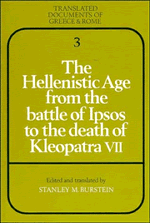Book contents
- Frontmatter
- Contents
- Volume Editor's Introduction
- Abbreviations
- Symbols
- Chapter 1 From Ipsos to Korupedion (301–281)
- Chapter 2 The Seleucid Kingdom
- Chapter 3 The Greeks in Baktria and India
- Chapter 4 Macedon and the Greeks of Europe
- Chapter 5 Pergamon
- Chapter 6 Ptolemaic Egypt: kingdom and empire
- Glossary
- Appendixes
- Indexes
Chapter 2 - The Seleucid Kingdom
Published online by Cambridge University Press: 01 June 2011
- Frontmatter
- Contents
- Volume Editor's Introduction
- Abbreviations
- Symbols
- Chapter 1 From Ipsos to Korupedion (301–281)
- Chapter 2 The Seleucid Kingdom
- Chapter 3 The Greeks in Baktria and India
- Chapter 4 Macedon and the Greeks of Europe
- Chapter 5 Pergamon
- Chapter 6 Ptolemaic Egypt: kingdom and empire
- Glossary
- Appendixes
- Indexes
Summary
A decree of Ilion honoring Antiochos I. Sigeum, about 280–278. Marble stele, early third-century lettering.
OGIS 219; *I. Ilion 32; cf. Memnon, FGrHist 434F9.1; Justin 25.1.1.
Bevan, Seleucus 1.127–35; Tarn, Gonatas 168; Magie, RRAM 1.95 and 2.925–6; L. Robert, Essays in Honor of C. B. Welles (New Haven 1966) 175–92 with photograph; Habicht, Gottmenschentum 83–5; Orth, Machtanspruch 43–51; 61–72; Will, Histoire 1.140; Mastrocinque, Caria 72–3; F. Piejko, Gnomon 52 (1980) 258.
Nymphis, son of Diotrephes, being epimenios, and the epistates being Dionysios, son of | Hippomedon, Demetrios, son of Dies, introduced the motion. Since King Antiochos (I), son of King | Seleukos (I), at the beginning (of his reign), after having taken over the kingdom and manifested an hon|orable and good policy, sought to bring the cities in Se∥leukis, which were hard pressed by harsh circumstances because of those who had rebelled against | his regime, back to peace and their old prosperity, | and, having advanced against those attacking his regime, as was just, (he sought) to re|gain his ancestral realm; wherefore, acting with a good and just purpose | and taking not only his friends and his army, who were zealous for the struggle for ∥ his regime, but also the divinity as a benevolent hel|per, he restored the cities to peace and his kingdom to its old condition;
- Type
- Chapter
- Information
- Publisher: Cambridge University PressPrint publication year: 1985



